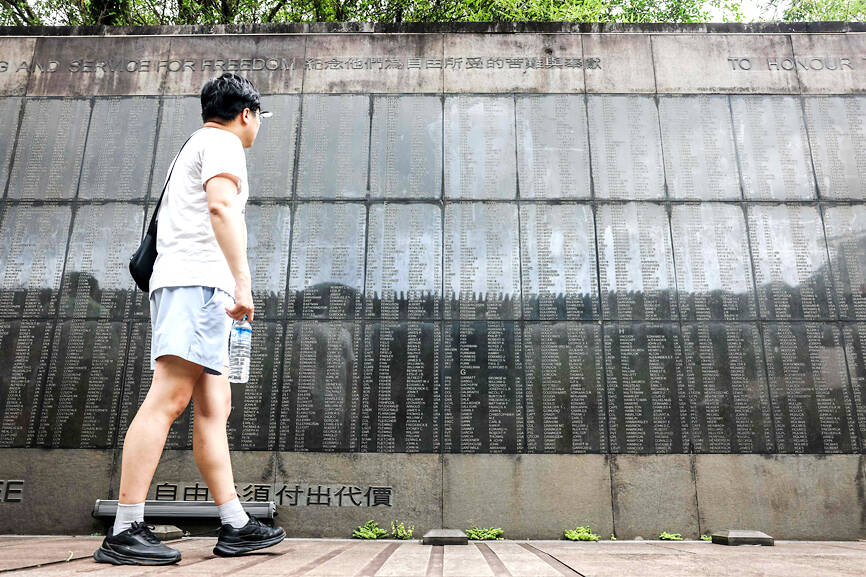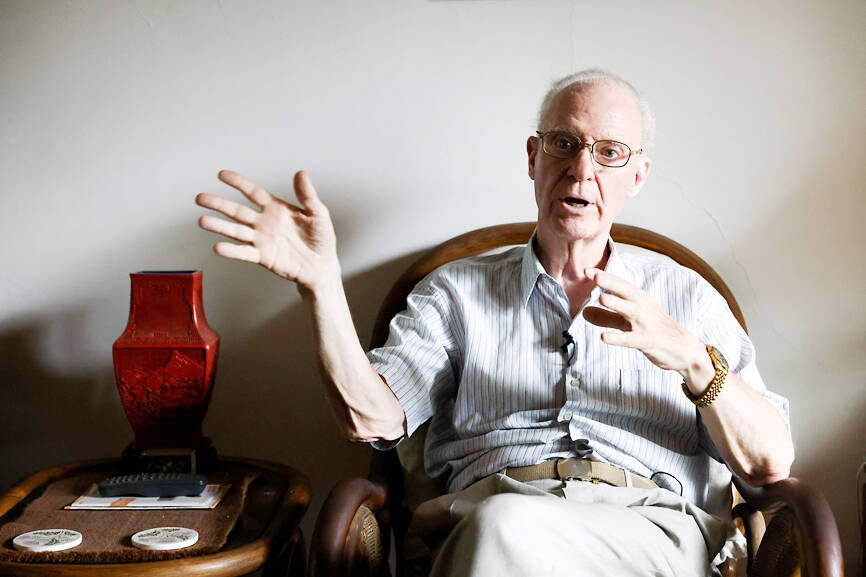In a small urban park in northern Taiwan, more than 4,000 names are etched into a granite wall — most of them British and US servicemen held by the Japanese during World War II.
The somber memorial sits on the site of Kinkaseki, a brutal prisoner of war (PoW) camp near Taipei and one of more than a dozen run by Japan in the country it ruled from 1895 until its defeat in 1945.
For decades, little was known of the PoW camps, said Michael Hurst, a Canadian amateur military historian in Taipei, who has spent years researching them.

Photo: I-hwa Cheng, AFP
Many survivors had refused to talk about their experiences, while PoWs held elsewhere in Asia had been unaware of “the horrors” in Taiwan, and museums and academics had glossed over them, Hurst said.
After learning of Kinkaseki in 1996, Hurst spearheaded efforts to locate other camps in Taiwan, build memorials for the veterans, and raise public awareness about their bravery and suffering.
Starting in 1942, more than 4,300 Allied servicemen captured on battlefields across Southeast Asia were sent to Taiwan in Japanese “hell ships.”

Photo: I-hwa Cheng, AFP
Most of the PoWs were British or American, but Australian, Dutch, Canadian and some New Zealand servicemen were also among them.
By the time the war ended, 430 men had died from malnutrition, disease, overwork and torture.
The harsh conditions of Taiwan’s camps were long overshadowed by Japan’s notorious “Death Railway” between Myanmar and Thailand, Hurst said.
More than 60,000 Allied PoWs worked as slave laborers on the line, with about 13,000 dying during construction, along with up to 100,000 civilians, mostly forced labor from the region.
Their experiences were later captured in the 1950s war movie The Bridge on the River Kwai.
However, as stories of Kinkaseki slowly emerged, it became “known as one of the worst PoW camps in all of Asia,” Hurst said.
Canadian filmmaker Anne Wheeler’s physician father was among the more than 1,100 prisoners of war held in Kinkaseki.
Wheeler said she and her three older brothers “grew up knowing nothing” about their father’s ordeal in the camp, where the men were forced to toil in a copper mine.
After her father’s death in 1963, Wheeler discovered his diaries recording his experience as a doctor during the war, including Taiwan, and turned them into a documentary.
A War Story recounts Ben Wheeler’s harrowing journey from Japan-occupied Singapore to Taiwan in 1942.
By the time her father arrived in Kinkaseki, Wheeler said the men there “were already starving and being overworked and were having a lot of mining injuries.”
They were also falling ill with “beriberi, malaria, dysentery, and the death count was going up quickly,” Wheeler, 78, said.
Trained in tropical medicine, the doctor had to be “inventive” with the rudimentary resources at hand to treat his fellow PoWs, who affectionately called him “the man sent from God,” she said.
Inflamed appendices and tonsils had to be removed without anesthesia using a razor blade because “that was all he had,” she said.
Taiwan was a key staging ground for Japan’s operations during the war. Many Taiwanese fought for Japan, while people there endured deadly US aerial bombings and food shortages.
Eighty years after Japan’s surrender, the former PoWs held in Taiwan are all dead and little physical evidence remains of the camps.
At 77, Hurst is still trying to keep their stories alive through the Taiwan PoW Camps Memorial Society and private tours.
His book Never Forgotten is based on interviews with more than 500 veterans, diaries kept by PoWs and correspondence.
A gate post and section of wall are all that remain of Kinkaseki, set in a residential neighborhood of Jinguashih, surrounded by lush, rolling hills.
A Taiwanese woman taking a tour with Hurst said she had “never” studied this part of World War II history at school.
“It’s very important because it’s one of Taiwan’s stories,” the 40-year-old said.
Hurst said he still receives several e-mails a week from families of PoWs wanting to know what happened to their loved ones in Taiwan.
“For all these years, maybe 50 years, they just kept it to themselves,” Hurst said.
“They knew what they’d suffered, and they knew that nobody else knew,” he added.

A preclearance service to facilitate entry for people traveling to select airports in Japan would be available from Thursday next week to Feb. 25 at Taiwan Taoyuan International Airport, Taoyuan International Airport Corp (TIAC) said on Tuesday. The service was first made available to Taiwanese travelers throughout the winter vacation of 2024 and during the Lunar New Year holiday. In addition to flights to the Japanese cities of Hakodate, Asahikawa, Akita, Sendai, Niigata, Okayama, Takamatsu, Kumamoto and Kagoshima, the service would be available to travelers to Kobe and Oita. The service can be accessed by passengers of 15 flight routes operated by

MORE FALL: An investigation into one of Xi’s key cronies, part of a broader ‘anti-corruption’ drive, indicates that he might have a deep distrust in the military, an expert said China’s latest military purge underscores systemic risks in its shift from collective leadership to sole rule under Chinese President Xi Jinping (習近平), and could disrupt its chain of command and military capabilities, a national security official said yesterday. If decisionmaking within the Chinese Communist Party has become “irrational” under one-man rule, the Taiwan Strait and the regional situation must be approached with extreme caution, given unforeseen risks, they added. The anonymous official made the remarks as China’s Central Military Commission Vice Chairman Zhang Youxia (張又俠) and Joint Staff Department Chief of Staff Liu Zhenli (劉振立) were reportedly being investigated for suspected “serious

ENHANCING EFFICIENCY: The apron can accommodate 16 airplanes overnight at Taoyuan airport while work on the third runway continues, the transport minister said A new temporary overnight parking apron at Taiwan Taoyuan International Airport is to start operating on Friday next week to boost operational efficiency while the third runway is being constructed, the Ministry of Transportation and Communications said yesterday. The apron — one of the crucial projects in the construction of the third runway — can accommodate 16 aircraft overnight at the nation’s largest international airport, Minister of Transportation and Communications Chen Shih-kai (陳世凱) told reporters while inspecting the new facility yesterday morning. Aside from providing the airport operator with greater flexibility in aircraft parking during the third runway construction,

American climber Alex Honnold is to attempt a free climb of Taipei 101 today at 9am, with traffic closures around the skyscraper. To accommodate the climb attempt and filming, the Taipei Department of Transportation said traffic controls would be enforced around the Taipei 101 area. If weather conditions delay the climb, the restrictions would be pushed back to tomorrow. Traffic controls would be in place today from 7am to 11am around the Taipei 101 area, the department said. Songzhi Road would be fully closed in both directions between Songlian Road and Xinyi Road Sec 5, it said, adding that bidirectional traffic controls would